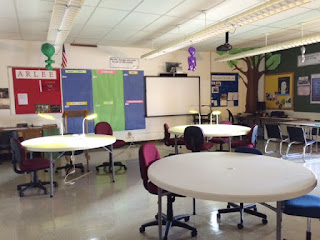Recently I sent an email home informing parents of students in my senior speech class that we run an essentially gradeless classroom. Students use a "success rubric" to guide and assess their progress, with assistance from their teacher. I wrote about this approach during a previous semester here, here, and here; it was overwhelmingly successful despite some students' initial fears.
Later that day I received a respectful disagreement from a parent who rejects this approach to grading because it doesn't reflect "real-world" consequences. This argument isn't surprising to me at all. But I kept coming back to it, my mind worrying it like a loose tooth.
Finally, this realization: grades in school share very little with job-related consequences in real life. Grades are superficial and vary in meaning from teacher to teacher. Teachers do not necessarily want to replicate the ways they do correspond, the subjectivity and arbitrariness.
And actually, very little in a traditional high school reflects the adult world of work. In what place in the world of work, for example, is a person shunted from room to room every 53 minutes with 3 minutes to take a break or use the bathroom? In what place in the world of work does an employee sit in a desk in rows and interact minimally with others? In what place is an adult told to succeed in a variety of very different disciplines? And where - other than in a school - is a person made to do all of this in a single day, day after day, for thirteen years? At best, traditional high school is a distorted reflection of the "real world."
Some might say that traditional approaches are good for training up our youth for a harsh world. While I see the point, I reject the logic: why must we use the same methods we - parents and teachers - ourselves experienced? We can innovate and still prepare our students.
In my classroom, I have thrown out desks in favor of collaborative spaces; this doesn't mean I don't ask to see individual performance.
I connect our classroom work to the world in which students live through field work and guest speakers; this doesn't mean I reject the "3 R's."
And I encourage students to think for themselves by removing superficial and authoritative grades; this does not mean there is no pressure to improve.
It's time not only to change our own environment, but to change the world of schooling for our students. And to do that, we have to change the hearts and minds of parents and community members, sometimes administrators and policymakers too.
We must un-distort our view of the real world and adjust our schools to match it - for now and for the future.



I constantly ask myself why we continue to do things the way they've been done and expect different outcomes. Change is frustratingly slow. Great read!
ReplyDeleteYour real challenge; help others to share the same vision you have for your students. Can be a real challenge. Is worth it.
ReplyDeleteYour real challenge; help others to share the same vision you have for your students. Can be a real challenge. Is worth it.
ReplyDelete